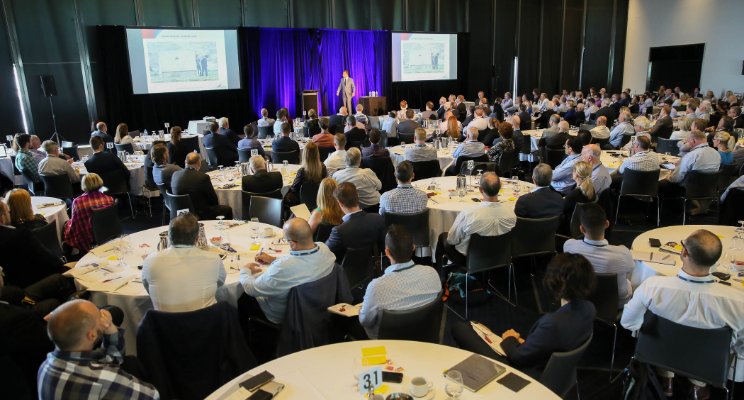
02 May Understanding a changing leadership landscape at All TEC Day
Each year, All TEC Day challenges hundreds of CEOs around the country to reflect on the future of leadership. Two of the themes for this year really stood out to me, especially as the full range of their impacts remains to be seen. The first concerns the idea of leading with authenticity. We’ve all seen the damage – reputational and otherwise – that occurs when leaders don’t act in good faith, but is that negative pressure the only reason to embrace authentic leadership?
Secondly, SME owners are aware of the pressure to adopt new technology solutions such as big data analytics to improve their business. However a full investment into these solutions isn’t always viable.
Why authentic leadership matters in a time of distrust
Over recent years, people have developed a deep distrust of leaders in all spheres, not just business. Increasingly, CEOs want to be seen as authentic leaders, and know what it takes to develop these traits in a genuine manner.
Arguably, all of us have the spark of leadership in us, whether it is in business, government, church or as a volunteer in a not-for-profit organisation. The challenge it would appear, is to understand ourselves to the degree where we use our unique leadership gift to serve others.
Understanding yourself starts with understanding the story of your life. That’s what offers context and meaning for the choices you have made, as well as how your experiences, interactions, values and beliefs can help you make an impact in the world.
As the novelist John Barth once wrote, “The story of your life is not your life. It is your story.” In other words, it is your own narrative that is important, as that is what gives context to the facts of your life.
Inevitably, it will be the transformative experiences in your story that provide your inspiration to understand and nurture the deeper purpose of your own leadership context.
Harold Hillman demystified the multi-faceted dimensions of authenticity for us at All TEC Day. This was highlighted by his own inspiring personal story and the genesis of his best selling book The Impostor Syndrome. Harold’s own struggle to become authentic was haunted by his life story and overcoming his hurdle of denial before making himself incredibly vulnerable. In his own words, his quest was to understand “how perfect do I need to be in an imperfect world?”.
Harold’s gift to leaders is that we need to learn from our life stories. This involves being self aware and leaning into vulnerability before practising your values and principles to the point where people would acknowledge you as an authentic leader. Be prepared to stand proudly in your own truth.
It’s this motivation that is possibly the most important when discussing authentic leadership. Authenticity isn’t about forced transparency to avoid reputation damage, it’s about wanting to be open and honest because it’s the right thing to do.
Is big data a worthy pursuit for SMEs?
CEOs are on the hook for performance, and for all of the hype associated with analytics, many leaders operating in real time are reporting underwhelming results.
There are disconnects with the promises and payoffs for big data analytics. Dr. Andrew Pratley reinforced this with one single slide that sucked the oxygen out of the room at All TEC Day. The data said to be 95% sure of making back the investment in big data, you need business revenue of at least $400 million.
Fortunately, Dr. Pratley then dealt with the assumption that many SMEs make: “big data” is for “big business”. It’s not true, there are opportunities for SMEs to use data to understand and improve the way they operate.
SMEs can improve the ways of looking at metrics relatively cost effectively, and in doing so, make better decisions. Dr Pratley challenged the room of CEOs with being clear about where the myths in their businesses lie.
It begins with being very purposeful about “where” your data is – and arguably there are 3 stores of “data” – staff, customers and systems. Quite often, third parties have “your data” or at least data more valuable to you than anyone else. An American example was given, Ticketmaster just sold the NY Yankees their own data for $100,000.
Typically, SMEs want data to help with 3 key questions:
- How can I benchmark against the competition?
- What is the market potential for our product?
- How could I predict industry trends?
The secret here is that the more narrow and scientific the question – the greater potential benefit.
Dr. Pratley also shared a simple “problem and application” framework for SMEs to answer their questions and expose their own myths. The framework covered two main points:
- SMEs have problems that can be divided into three main categories – Probability, differences and relationships
- There are then five different applications to resolve them – Sales, leadership, strategy, pricing and products
When we try to progress big business questions, we must start with data and information that people really know or sense might be right. The key then is to find cost-effective ways to investigate this, such as through tools like SurveyMonkey or any other solution that helps you gather and analyse data without overspending.
This post was originally published in LinkedIn, April 20, 2017


No Comments